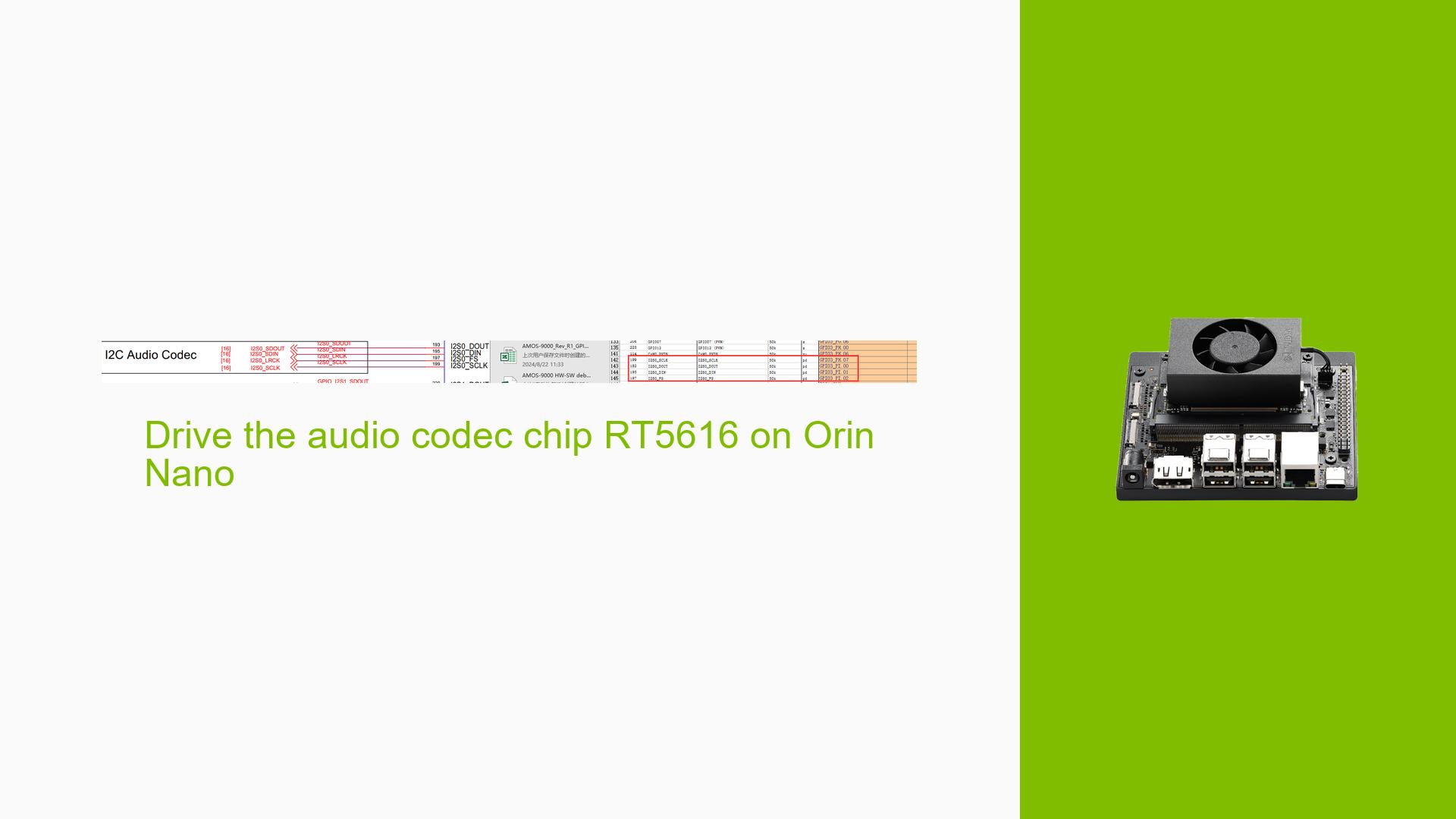Drive the audio codec chip RT5616 on Orin Nano
Issue Overview
Users are encountering issues when attempting to drive the RT5616 audio codec chip on the Nvidia Jetson Orin Nano Dev board. The primary symptoms include:
- Successful I2C communication but failure to detect the sound card.
- Errors related to setting the Digital Audio Interface (DAI) format, specifically
-22errors during driver probing, indicating a failure in driver initialization. - Users report that while the sound card appears to be registered, audio playback is not functioning correctly, with playback completing too quickly and no sound output during tests.
The problem occurs primarily during setup and configuration of the audio codec, particularly when modifying device tree source (DTS) files. The hardware in question includes a custom board using Jetpack version 5.1.3 (sdk35.5). Users have modified key DTS files such as tegra234-soc-i2c.dts and tegra234-p3767-common-audio.dtsi, but have not achieved successful audio output.
The impact of this issue is significant as it prevents users from utilizing audio functionality on their devices, which may hinder development or application deployment that relies on sound output.
Possible Causes
The following potential causes have been identified for the issues experienced by users:
-
Hardware Incompatibilities or Defects: Custom board configurations may not align with expected hardware setups, leading to detection issues.
-
Software Bugs or Conflicts: The Jetpack version or specific driver versions may contain bugs that affect audio codec functionality.
-
Configuration Errors: Incorrect modifications in DTS files may lead to improper initialization of the sound card or incorrect routing of audio signals.
-
Driver Issues: Errors in driver code or missing modules could prevent proper interaction with the RT5616 codec.
-
Environmental Factors: Power supply inconsistencies or overheating could affect performance and stability.
-
User Errors or Misconfigurations: Misunderstandings in setting up device tree nodes or mixer controls could lead to failures in audio playback.
Each of these causes can contribute to the overall problem of detecting and utilizing the RT5616 codec on the Orin Nano platform.
Troubleshooting Steps, Solutions & Fixes
To address these issues, users are encouraged to follow these troubleshooting steps and solutions:
-
Verify Hardware Setup:
- Confirm that all connections are secure and that the correct pins are being used for I2S communication.
- Ensure that you are using the correct I2S interface from the 40-pin expansion header.
-
Check Device Tree Modifications:
- Review changes made to
tegra234-soc-i2c.dtsandtegra234-p3767-common-audio.dtsifor accuracy. - Ensure that nodes related to I2S0/I2S2 are correctly defined. For example:
&i2s2_to_codec { status = "okay"; link-name = "rt5616-playback"; codec { sound-dai = <&rt5616_codec 0>; }; };
- Review changes made to
-
Inspect dmesg Logs:
- Run
dmesgto check for any error messages related to audio initialization. Look for lines indicating errors with DAI formats or sound card registration. - Compare logs before and after modifications to identify changes in behavior.
- Run
-
Test Audio Playback Commands:
- After setting mixer controls, use commands like:
amixer -c APE cset name="I2S2 MUX" "ADMAIF2" speaker-test -D hw:APE,1 -r 48000 -c 2 -F S32_LE -t sine -f 1000 - Ensure all necessary mixer controls are set correctly:
amixer -c1 cset name='DAC MIXL INF1 Switch' 1 amixer -c1 cset name='DAC MIXR INF1 Switch' 1 amixer -c1 cset name='Stereo DAC MIXL DAC L1 Switch' 1 amixer -c1 cset name='Stereo DAC MIXR DAC R1 Switch' 1 amixer -c1 cset name='HPO MIX DAC1 Switch' 1 amixer -c1 cset name='HP Playback Volume' 39
- After setting mixer controls, use commands like:
-
Driver Module Verification:
- Ensure all necessary driver modules are loaded. Check if any additional modules need to be installed for proper operation of ADMAIF interfaces.
-
Consult Documentation:
- Refer to NVIDIA’s Audio Setup and Development — NVIDIA Jetson Linux Developer Guide for guidance on porting audio drivers and configurations.
-
Isolate Configuration Issues:
- If problems persist, revert changes incrementally to identify if a specific modification caused the issue.
- Test with a known working configuration if available.
-
Community Support:
- Engage with community forums for shared experiences and solutions from other users who have successfully configured similar setups.
By following these troubleshooting steps, users should be able to diagnose and potentially resolve issues related to driving the RT5616 audio codec on their Nvidia Jetson Orin Nano Dev boards.
